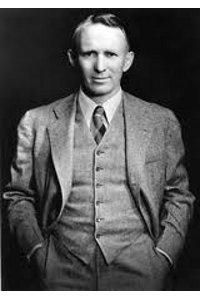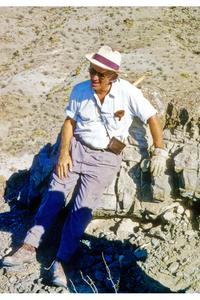Ronald K. DeFord Field Scholarship Fund
After nominal retirement in 1972 and appointment as Professor Emeritus, he continued until 1987 as the faculty supervisor of Technical Sessions, a one hour course meeting twice a week which was required of all graduate students to learn clear, effective speaking. He then retired in fact at the age of 85, partly because of the afflictions of Parkinson’s disease. Professor DeFord’s influence on the Department and University was immense, as a teacher, a leader, and a colleague. As Graduate Advisor in the Department, Professor DeFord encouraged all students to acquire an adequate foundation not only in geology, but also in mathematics, physics, chemistry, English, foreign language, and fine arts.
His interests and skills in English usage were always evident when he edited student manuscripts. Among the memorable courses he taught were undergraduate classes in physical geology and graduate courses in Geology of Fluids and Advanced General Geology. Vigorous discussions with students were hallmarks of his teaching. From the 1960s on, Professor DeFord was the only full-time faculty member without a PhD degree. This was not an issue with his faculty colleagues, but, insisting on proper titles, he corrected people who addressed him as Dr. DeFord: “I am Professor DeFord” was his response. Ronald DeFord, age 92, Professor Emeritus of Geological Sciences, died May 7, 1994. He will forever be remembered with great respect, love and affection by his family, friends, students and colleagues.


For 35 years, Professor DeFord was married to Mary Amma Spence. Her quiet and unassuming strength complimented his forthright and exacting manner. She accompanied him on many summer field trips as an active participant living in primitive conditions. UT Austin President Emeritus and former Director of the Jackson School’s Bureau of Economic Geology, Dr. Peter T. Flawn, recalls them as “inseparable” and remembers first meeting her in an adobe motel in Kent, Texas while she awaited Professor DeFord’s return from the Apache Mountains. Dr. William L. Fisher, the first dean of the Jackson School and another former bureau director, considered them the “social glue” of the Department of Geology for their hosting of numerous faculty parties. Amma passed away in 1976.
Professor DeFord met his second wife, Marion (B.A. ’46 English with Honors), at a dance in the mid 1970s. “He was, she says, “a marvelous dancer.” They married in 1978 and were very active patrons of the arts and museums in Austin. They were founding members of the Austin Lyric Opera and a great supporters of Ballet Austin and the Austin Symphony Orchestra. Professor DeFord was also part of the group who started University Federal Credit Union. When illness forced him to stop driving, Marion served as his chauffeur, attended his Technical Sessions classes with him, and assisted with his administrative tasks. She took him to AAPG meetings in San Francisco, San Antonio, Dallas, Atlanta and Denver, even when he was in a wheelchair. They faithfully attended the Austin Geological Society meetings until Ronald’s death. In 1994, the AGS presented her with a plaque which stated “The AGS recognizes Marion W. DeFord in appreciation of her loyal support of the Society and her devoted assistance provided to a fellow member, the late Ronald K. DeFord.” Until his death, she cared for him in their beloved home where he could enjoy all his books and paintings, and he could watch all the wildlife he loved on the property. Marion continues to actively support the Jackson School, most especially in creating the Ronald K. DeFord Graduate Advising Office in the school’s new student center.
In 2011, Professor DeFord was inducted into the Jackson School’s Hall of Distinction. This honor pays tribute to individuals who are or were strongly affiliated with the school and who achieved exceptional distinction and standing in academia, industry or government. Dr. Hugh Hay-Roe (Ph.D. ’58) remembers how Professor DeFord gave him a chance at UT Austin, where other schools would not because the University of Alberta, where Dr. Hay-Roe earned his BS in Geology, used a different grading system then schools in the United States. In As he tells it, “Back in the late 1940s the University of Alberta had a grading system very different from that used at UT. Because of that, my undergraduate grades looked terrible by American standards. In applying to U.S. universities to enter a Masters program, I tried to explain why my grades looked so bad. The folks at the University of Oklahoma sent a rejection letter, kindly suggesting that I just go out and get a job, as I was not qualified for graduate work.” Professor DeFord, however, took a chance on Dr. Hay-Roe and even inspired Dr. Hay-Roe to pursue a Ph.D. after his Masters. Dr. Hay-Roe asked DeFord if he thought he could handle the work load necessary for a doctorate. “Absolutely,” responded DeFord.
Dr. Hay-Roe helped to create this endowment because without Professor DeFord’s involvement, Hay-Roe would never have studied in Austin. “The endowment, he says, “is a way of giving something back to the institution that had such a profound impact on my life and career.” With respect to the impact he hopes the endowment will have on the Jackson School and UT Austin communities, Dr. Hay-Roe is clear: “Although the geosciences have expanded enormously in the past half-century, and now cover areas of study that didn’t exist 50 years ago, field geology could still be considered one of the basics. In scattered regions of the world there are still regions that have not been mapped and sampled in detail, although such work is now obviously streamlined via mapping from satellite images, airborne gravimetry, magnetometry, etc., and the use of helicopters for just “dropping in” to obtain rock samples in areas with no roads. I hope that the endowment will help graduate students to expedite their work using all the tools now available.”
How to Give
Learn more at giving.utexas.edu
Search Endowments
Look for inspiring stories
